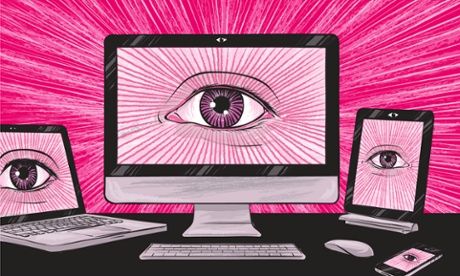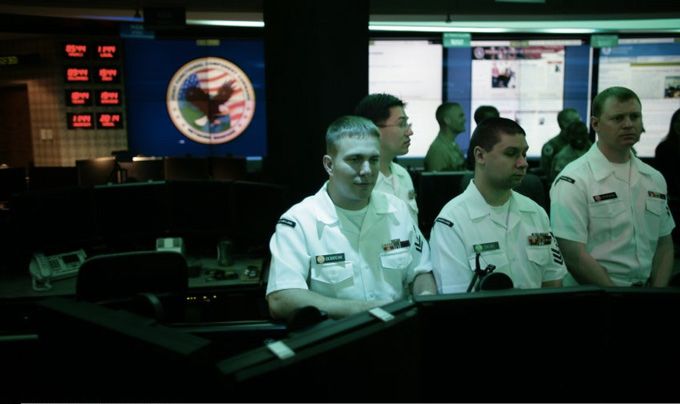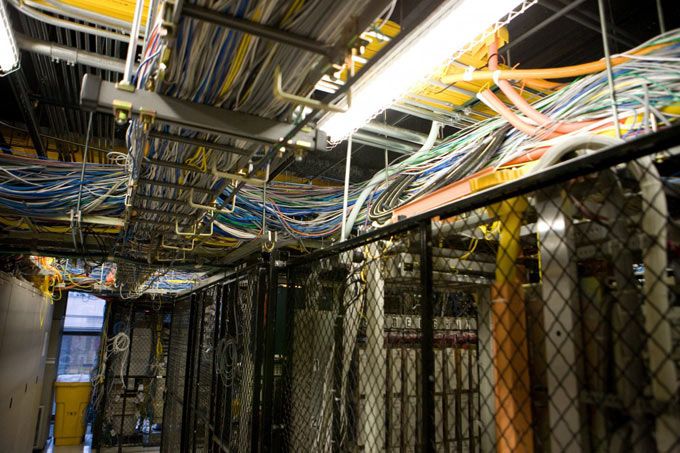BREAKING UP WITH THE INTERNET
| March 24, 2014
About a month ago, I was asked to join some serious writers (Colin Toibin, Zadie Smith, etc.) at a reading in support of a small-ish book review called Bookforum. (It is bundled in with Artforum, though it is sort of a stand alone periodical as well). The theme we were given was "The Night We Called It A Day," and I applied that to something I'd been thinking about—what will the world be like AFTER the Internet? Not what would the world be like, what WILL the world be like, as all things eventually pass. There is some sci-fi speculation in the piece as well.
The piece was picked up (in edited and fact-checked form) by Creative Time Reports, who shared it with The Guardian—who are running it as well. Enjoy. (The cover image came from here!)
What will life be like after the Internet? Thanks to the mass surveillance undertaken by the National Security Agency (NSA) and the general creepiness of companies like Google and Facebook, I’ve found myself considering this question. I mean, nothing lasts forever, right?
There’s a broad tech backlash going on right now; I wonder just how deep the disillusionment runs. I get the feeling that there are folks out there who would relish putting the Internet behind us sooner rather than later. Imagine that: even the Internet could be a thing of the past one day. What would that be like? No Facebook. No Google. No government nerds looking through your webcam.
But could we become more secure without abandoning the Internet? What if there’s a third way? One that doesn’t involve either passive resignation to being exploited or a Luddite smash-the-looms fantasy. What if we began to develop and encourage the adoption of machines and a network that are actually secure—through which neither thieves, corporations, nor the NSA could track us—and what if these could be configured by us, to really do what we want them to do? To stop the spying, stealing and monitoring, but to allow other things to continue.
What would that look like?
A Problem: Maybe the Internet Wasn’t Built to Be Secure
We all know that the NSA and the U.K.’s Government Communication Headquarters are reading our emails and texts, listening to our phone conversations, storing our metadata and using our computers and phones to watch us. A bunch of dorky guys amassing huge collections of pictures of tits and dicks. Here they are, hard at work, protecting us:
I know I feel safer now! Happy viewing, guys! If we had any doubts before, now we know that the government doesn’t trust us—so very many of us—and we certainly don’t trust it.
Meanwhile, thieves have managed to get their hands on more than 100 million credit card numbers and PINs from Target and Neiman Marcus. Lots of cyber thieves operate in the former Soviet republics, so maybe that new sports car in Baku or that night on the town in Sofia is courtesy of your hard-earned savings.
It’s not just the government and thieves who take advantage of the web’s weird combination of opacity and insecurity; Google, Apple, Facebook, Microsoft and other tech companies repurpose our phones and tablets into tracking and monitoring devices. Google, for one, makes a lot of money gathering information from us and selling it to advertisers. The free conveniences we enjoy—email, endless web browsing, cats and all sorts of gossip—are not, in fact, free. They are merely clever trade-offs for information about you. In return for access to much of the world’s knowledge, we hand over valuable personal information about everything we believe, everything we’re curious about, everything we desire or fear—everything that makes us who we are, at least to the retailers, advertisers and secret government agencies on the receiving end.
It is we who are being sold.
Trading our privacy for the convenience of a Google search is not so different from giving up constitutionally protected freedoms in exchange for the “security” that our government claims to offer. At least with Google and other tech services we know we’re getting something; whether we actually are more secure because of the NSA’s surveillance is an unresolved question. We are frequently told that this indiscriminate data collection has produced valuable results, but those results are “secret,” so you’ll just have to trust the government. I’m not saying we don’t need strong security measures to protect us from lunatics, but this dragnet surveillance has gone way beyond meeting that need.
Cyber thieves, for their part, don’t offer the average Internet user anything in return—not only that, but they make money selling information about the security gaps they find to the U.S. government. It’s an open question whether the government actually wants to patch up those holes and make the Internet more secure. For now, it’s in its interest to keep these holes open—available for future use but secret. And we know how good the government is at keeping secrets.
To a lot of folks it appears that the corporations, the thieves and the government are all doing exactly the same thing: the “legal” behavior and the illegal theft are cousins. Online spying and cyber theft are not freak phenomena; increasingly, they appear to be unavoidable consequences of online access as it now exists.
As the Internet has become more integral to our lives, we’ve simultaneously become more vulnerable, and the web has started to act like a bully, a drug dealer. It knows we need it, love it and are addicted to it, so it can take advantage of that need.
Moreover, the Internet is no longer even egalitarian. And that was one of the big pluses! Once it seemed that everyone had the same access to information. Soon, though, its glories will be available only to those who can afford them. Recently, Verizon won a court ruling against net neutrality, which the Federal Communications Commission has announced it will not appeal, so the way is clear for corporations to play favorites with Internet traffic. Clearly this miraculous technology—developed in part with the noble ambition that nuclear scientists might communicate freely—has been perverted into something dark and disturbing.
A Thought Experiment: What If We Broke the Internet?
These deteriorating conditions feed into the rapidly growing discontent regarding the Internet. What if the disillusionment eventually reaches a point at which many feel that the free services and convenience no longer compensate for the exploitation, control and surveillance? What if, one night, a small group of people decide they’ve had enough and say, “Let’s call it a day”? What exactly might this imaginary band of outsiders do? Would they or could they shut down the entire Internet? Is that even possible? And what would be the consequences? Now, let’s be clear, I’m not advocating this, but I also don’t think it’s outside the realm of possibility.
As we all know by now, the NSA tapped into a vast amount of international and domestic Internet communications by installing devices in small rooms in data centers in San Francisco and a few other places. It didn’t require an all-out assault to subvert one of these fortresses—just a small intervention with impunity and intent. Here is what the inside of one of these buildings looks like:
That’s what makes it all work? My music studio isn’t this messy!
The Internet, it seems, is not “nowhere.” There are nodes in the Internet, where great amounts of data come and go, and they do have real physical locations. Intercept a few of these nodes—there are some here in downtown New York, linked to some in Lisbon, where the fiber optic cables surface—and you can infiltrate the whole world, as the NSA knows. They needed access to only a few so-called "urban giants" to get what they wanted.
So…imagine that a hypothetical group of disillusioned citizens obtains access to the same nodes—let’s say it’s an inside job by some building employees—but instead of tapping the nodes, as the NSA did, they break them. And to avoid any possibility of repair, they detonate a small timed radioactive paintball after they leave. No one gets hurt, but the radioactive splatter creates a no-go zone. As a result, no one can fix the fiber optics or even get near them for, let’s say, 100 years. The city outside, and even the rest of the building, might remain safe, but don’t go near that room on the 20th floor!
This might sound far-fetched. Surely no one can “break” the Internet! The Internet is our friend! And how could anyone even get into the buildings that keep it running?! But as we’ve seen, neither our “security” organizations nor the world’s largest corporations are very good at keeping their shit secure.
OK, now, for the sake of this thought experiment…
A Wasteland: What If the Web As We Know It Didn’t Exist?
The Internet is a thing of the past. What now?
Obviously business goes haywire, to say nothing of the profitable business of watching us. High-speed automated trading, which makes up half or more of New York’s stock market activity (though the proportion is currently declining), ends. Wall Street initially crashes, but eventually it finds a new normal. (There was trading before the Internet, after all.) Streaming movies and music, however, is totally over. Skyping your grandmother—over.
Google is now absolutely worthless, though it still has all its existing data housed in massive server farms. No more drones will take flight or drop bombs on Pakistan or Yemen. Cash and checks are still pretty good; credit and debit cards can’t rely on Internet connections to verify accounts anymore—though they still work, as they did before the web. Amazon has ceased to exist, and huge brick-and-mortar stores like Wal-Mart have lost track of their massive inventories. Small towns and bookstores make a comeback! Even record stores!
No one can unfriend you, and Mark Zuckerberg won’t know what and whom you like or don’t like ever again. Online courses will halt; teachers will have to teach their students face-to-face. The singularity will be postponed.
Would the world really be a better place without the Internet? Is a complete reset really necessary?
For some, the Internet has offered endless moneymaking opportunities, but whether many of the web’s touted benefits end up reaching the majority of people is debatable. More and more, it seems that only a minority are making a fortune off what was extolled as a universally liberating technology.
To be fair, the Internet offers some egalitarian benefits, besides pictures of cats. There’s the well-publicized assistance it lends to movements for human rights and democracy and the instantaneously accessible forum it provides for much of the world’s knowledge. Truth be told, the Internet didn’t actually create any of those movements or that knowledge, but it has certainly empowered a lot of previously voiceless people who now have access to them.
It’s hard to weigh the worth of the Internet because we can’t even imagine life without it. We’ve internalized it. It’s part of us, which explains why we are exploited so easily online. Is the Internet a cancer killing us little by little or a wonderful cybernetic extension of our brains? Let’s say we wanted to rid ourselves of the cancer. Would the cure be catastrophic or would the liberation be worth it?
A Utopia: What Would a Revised Internet Look Like?
Could we become more secure without abandoning the Internet?
To be honest, I have a hard time imagining Internet 2.0. I’m old enough to remember the utopian enthusiasm that greeted the Internet when it emerged 20 years ago. We can’t go back—we know too much now—but maybe we can learn from what we loved about the Internet back then. Namely, its egalitarian nature—that homemade and small-scale sites were just as accessible as the emerging e-commerce platforms. It was a pleasant, chaotic jumble. Can we revive the feeling of a souk and lose the big-box store feel?
Some folks have advocated that the Internet be considered a utility. A “necessary” part of our lives like water, electricity or gas. It might be better to have some fair regulation than to let market forces shape the landscape. Can you imagine if corporations owned our water supply?
Imagine this: in a new Internet, we’d still be able to send emails. Academic and nonprofit institutions would still share resources online. Wikipedia and web-based journalism would still exist. But if we can’t be tracked as we are now, a lot would change. Google would lose its primary sources of revenue—ads—and return to being a very good search engine, with a lot fewer employees. The NSA and the other data thieves and collectors would be helpless. No one would have data on countless innocent citizens that could be repurposed to God knows what ends. The Chinese couldn’t hack into the North American power grid.
All that money that was poured into online surveillance programs could of course now be spent on health and education (I did say “could”—I’m being very optimistic). That would actually increase security—worldwide. It’s pretty well accepted that extreme poverty breeds terrorism. Offering attractive alternatives to extremism that lead to better lives is the way to win the “war on terror.” Guns, drones and mass surveillance do the opposite: they actually breed terrorism. If we have the imagination to rethink both network security and national security—and that’s a big if—then the whole world would have the opportunity to become safer, no matter what the U.S. government claims.
Is there a will to change?
Let’s assume that such a secure network structure is technically possible. Internet 2.0 for real. Even if it is technically possible, I have a feeling that it might take a lot of willpower to walk away from the tit of convenience. Corporations and governments have built massive economic and political systems based on our accepting things as they are, and they will fight powerfully against any reforms.
What could make that surge of willpower come into existence? The information hoovering that corporations engage in is of a kind with the government surveillance; in both cases we are prey to distant agendas. The three forms (if one includes cyber crime) of data gathering are all connected—and none of them make us happier or more secure.
Reassessing what makes us secure might be a start. Real lifelong security comes not from the barrel of a gun or from being able to spy on your fellow citizens like a Stasi informant; it comes with less harsh extremes of wealth and poverty and increased access to health care and education. Embracing the security that comes with a more robust democracy is far preferable to other incentives to change, like all our credit cards becoming worthless or the NSA leaking incriminating webcam pictures of its critics. Before a catastrophic collapse like the one I described comes, let’s find it within ourselves to give up some convenience and become a little more human.







